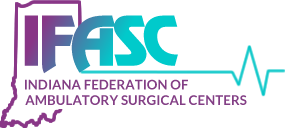About
About IFASC
IFASC History
In 1987, there were eighteen licensed surgical centers in the state of Indiana. A meeting of interested parties took place on April 28, 1987, of twelve individuals representing nine ambulatory surgical centers (ASC's).
The Indiana Federation of Ambulatory Surgical Centers, Inc. was incorporated on June 23, 1987.
Charter members included:
- William E. Herber, Muncie Eye Center, President
- Charlotte Boden, Surgical Care Center, Vice President
- Rick S. Mohler, American Surgical Care Center, Treasurer
- Connie Pence, Fort Wayne Ophthalmic Surgical Center, Secretary
- Doreen Merill, MHC Surgical Center, Director
- Bill Draffen, Indiana Eye Clinic, Director
- Brenda Cammerling, University Heights Surgical Center, Director
- Kate Cancel, American Surgery Center North, Director
- Daryll E. Franklin, American Surgery Center
- Linda K. Rugenstein, American Surgery Center
- Marsha S. Parker, John-Kenyon Eye Center
- Carol A. Miller, Hand Surgery Associates of Indiana
- Jack Erick, Fort Wayne Surgical Center
- Heidi Inskeep
- Roger Pence
- Ronald McGuire
- John Gilliland, II, Attorney
- Jennifer J. Abrell, Attorney
The Indiana Federation of Ambulatory Surgical Centers was one of the first state associations and continues to function successfully. The Federation's Board of Directors is made up of strong individuals who volunteer their "free" time to keep the organization a worthwhile investment for its members.
IFASC Vision And Values Statement
- We strive to be attentive to changes in the healthcare environment and to adapt accordingly for the benefit of our members.
- We value the knowledge of our members based on their years of experience in the industry.
- Our primary concerns are patient safety and satisfaction and we strive to be responsive to the needs and concerns of patients electing to have their surgical experience in the ambulatory surgery setting.
- We value and respect the great diversity of ideas held by our members and we encourage open dialogue amongst our members that does not activate (or insight) the anti-trust laws.
- We share concern about the cost of healthcare and focus on assisting our members to provide the highest quality care at the lowest cost while maintaining the financial viability of their organization.
- We believe in working environments that combine professionalism, quality patient care, employee satisfaction and enjoyment.
- We believe in assisting our surgical centers to maintain the provision of quality care through the provision of educational opportunities that give them the information needed to comply with state and federal mandates as well as maintaining their credentials and improving leadership skills.
- We believe in building a community that promotes open sharing of ideas and knowledge between our organization and other stakeholders in the field of ambulatory surgery.
IFASC Accomplishments
- Worked with the Indiana State Department of Health to rewrite the rules affecting ambulatory surgical centers.
- Influenced legislation adding a voting member to the Hospital Council that is representative of ambulatory surgical centers. Also have a nonvoting representative on this Council.
- Network with FASA and Illinois Freestanding Surgery Center Association.
- Provide biannual membership meetings at a minimum cost to the membership.
- Established a web site with links to sites of benefit to our members and to the public.
- Monitor state and federal legislation that would impact the operations of all surgical centers in Indiana. Prepared to take action on any legislation that would negatively affect ASCs.
- Kept membership dues affordable while at the same time building up the treasury in order to provide services to the membership at no or low cost.
- Developed a positive working relationship with the Indiana State Department of Health, which solicits input from the Federation on matters affecting surgical centers.
- Influenced the interpretation of the state statute related to the performance of procedures requiring no more than twenty-four hour stay to allow the clock to begin "twenty-four hours from the patient's arrival at the center, but in no event, later than the on-site administration of preoperative medication or admission the surgical suite, whichever comes first, as noted in the patient's medical record."
- Magazine-style triannual publication with relevant articles and membership information.



